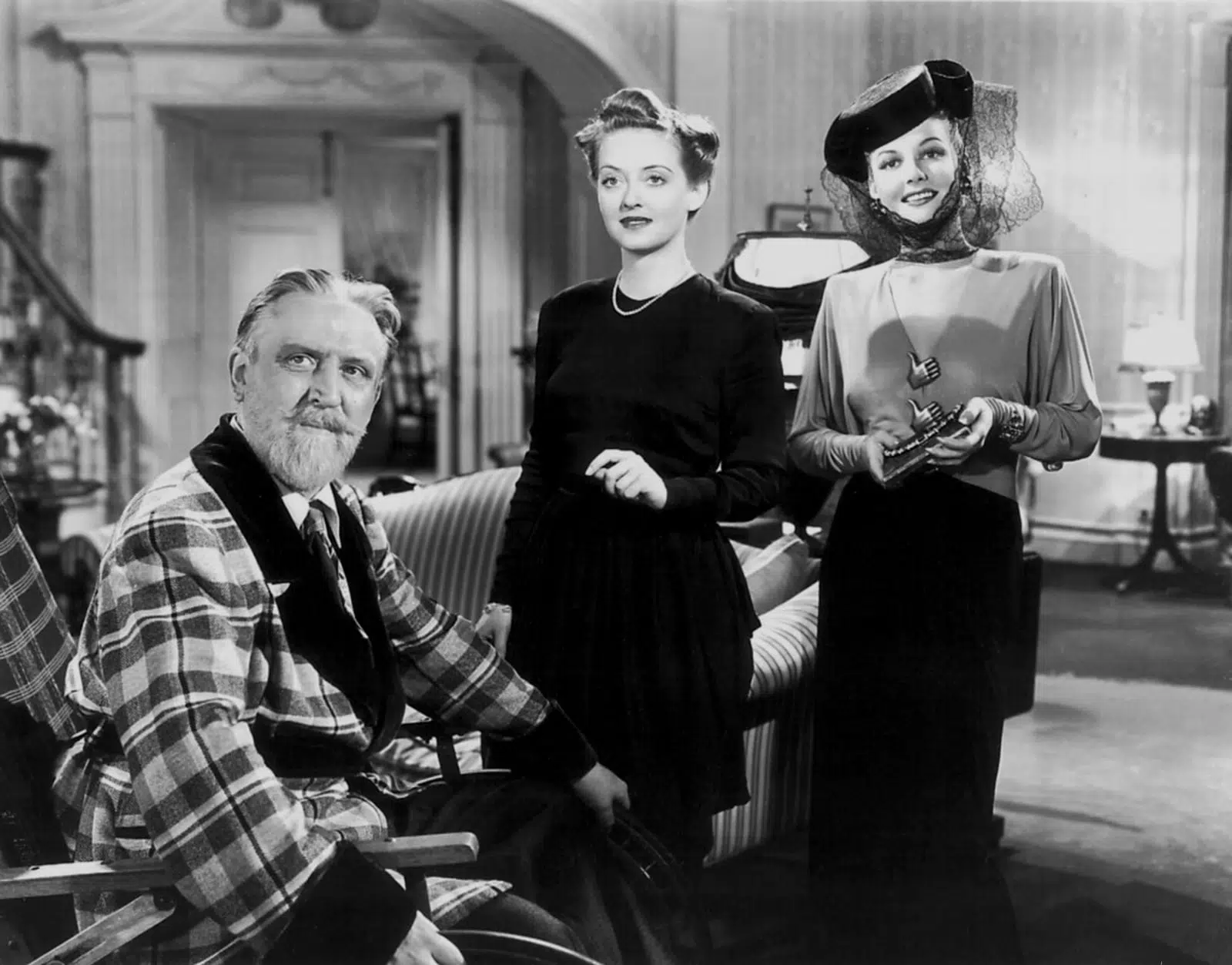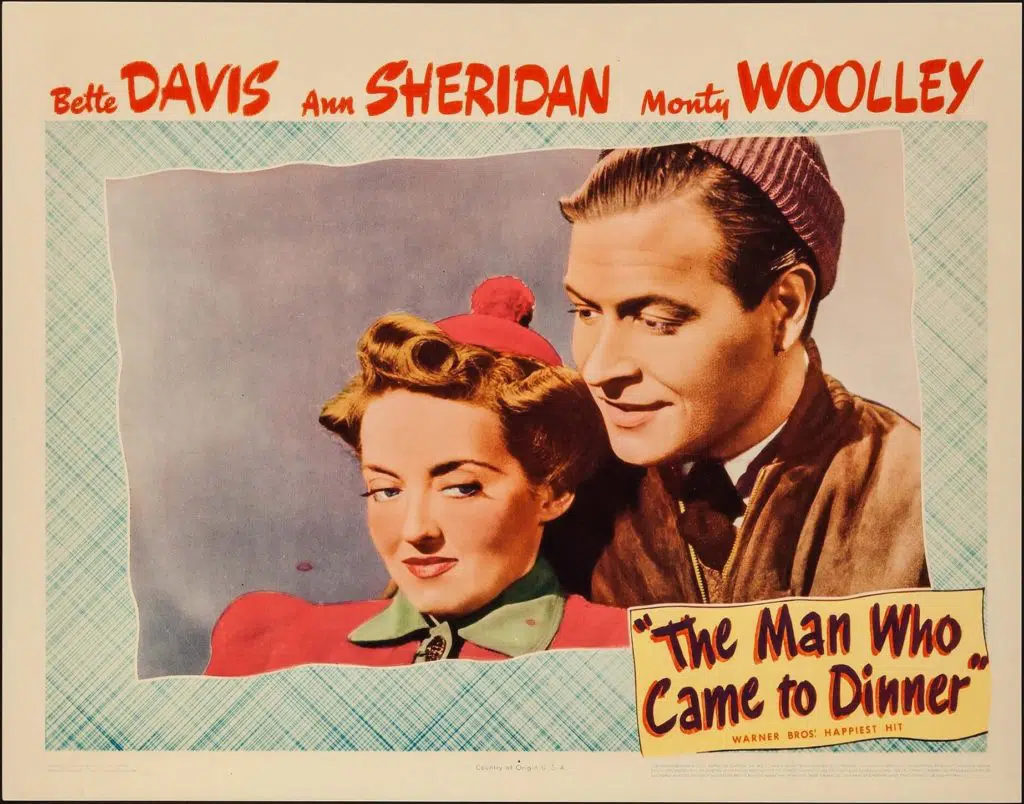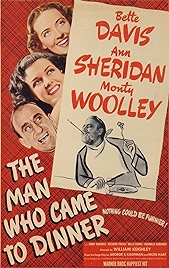The Man Who Came to Dinner claims to star Bette Davis, but this is not true. The real star – the person around whom the story revolves, who drives the plot and takes up most of the screen time – is Monty Woolley, as the eponymous “man”.
He’s the hoity-toity metropolitan-elite writer who arrives in a nowheresville town along with his personal assistant Maggie (Davis), complaining loudly of having to have dinner with “mid-western barbarians”. The Stanleys (Grant Mitchell, Billie Burke) are middle-class stalwarts – he’s in ball bearings, she’s a fluttery wife – and she’s delighted that Sheridan Whiteside (Woolley) has deigned to grace them with his presence. Until Whiteside slips on the icy steps up to their front door, damages his hip and tyrannically takes over their house, forcing them to wait on him hand and foot, or else suffer even worse from the suit of negligence he’s planning to hit them with.
Davis playing a secretary and as second banana is a bit of an oddity but she’d seen the original play on Broadway and had fallen in love with it. The fact that she thought she was going to be playing opposite John Barrymore (grandfather of Drew) had sealed the deal. In the end Barrymore’s alcoholism got the better of him and the role went instead to Woolley, an inveterate scene-stealer known to his friend Cole Porter as “the Beard”. Not a “beard” in the closeted queer sense – though both Porter and Woolley were gay – but in the good old fashioned sense of having a beard. It, along with Woolley’s big booming voice and bearish character, is his defining feature.
A proper old-fashioned farce develops, picking up speed as it goes, with more characters spun into the mix as the unstoppable Whiteside co-opts more and more people into his self-centred world, including eventually a vampish actress who he’s got in to thwart the budding romance that his secretary is having with local reporter Bert Jefferson (Richard Travis). Finally, a bit of action for the great Bette Davis, who’d already won two Oscars and still had Now, Voyager, All About Eve and The Virgin Queen ahead of her.
As I say, farce, fast and furious, lots of people, and eventually a crate with an octopus in it, a pack of penguins, the Stanleys and their adult children, both of whom Whiteside persuades to do things the father doesn’t approve of. The local doctor, a gang of convicts from the local prison, a delegation of Chinese dignitaries, plus phone calls from Winston Churchill, Eleanor Roosevelt, the lusty actress (Ann Sheridan), a nurse dancing attendance on Whiteside, a union organiser at Stanley’s factory who’s fallen for his daughter, June (Elisabeth Fraser). Choirboys. Radio technicians. An Egyptian sarcophagus. On and on it goes.
Names are dropped – Zasu Pitts, the Lunts, Admiral Byrd, Barbara Hutton – to indicate tone and make us aware how very “now” everything is. It’s all frightfully frightfully Broadway. The original play was written by Moss Hart (A Star Is Born) and George Kaufman. Kaufman is responsible for the madcap speediness of it. In fact it’s tempting, as the frame fills up with people, to see the whole film as an extended variation on the famous cabin scene in the Marx Brothers’ A Night at the Opera, which Kaufman also wrote. When Jimmy Durante finally shows up, behaving almost like a mix between Groucho and Harpo Marx, cracking wise and sweeping anything in a skirt off its feet… well.
Davis didn’t like the finished result, possibly because she is so roundly eclipsed by Woolley, who was indeed a member of the metropolitan elite (he’d been a Yale professor only a few years before and palled about with the smart New York set). Woolley is brilliant but he isn’t so much acting Davis off the screen as bellowing her off it, and director William Keighley’s static directing doesn’t help with the stage-to-screen transfer, even though he’s had cinematic rewrites done by the brilliant Epstein brothers (of Casablanca fame).
Though Whiteside’s put-downs are meant to be screamingly hilarious – monster at work – they’re mostly not, partly because Woolley muffs the delivery of quite a few of them, and partly because it’s not amusing watching blameless people being bullied. In spite of all this, The Man Who Came to Dinner deserves the plaudits. It’s a knowingly absurd farce that’s been brilliantly engineered, and is played by a superb cast. And for these reasons, rather than the fairly incidental one of Bette Davis being in it, it’s one of the best films of the 1940s.
The Man Who Came to Dinner – Watch it/buy it at Amazon
I am an Amazon affiliate
© Steve Morrissey 2021


